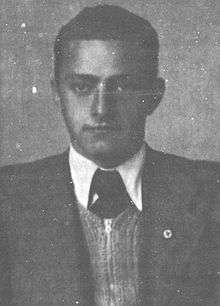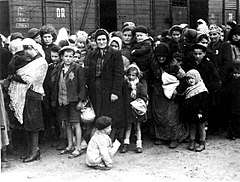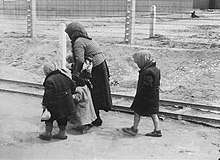Siegfried Seidl
Siegfried Seidl (24 August 1911 in Tulln, Austria-Hungary – 4 February 1947 in Vienna) was an Austrian career officer and World War II Commandant of the Theresienstadt concentration camp located in the present-day Czech Republic. He also was commandant of the Bergen-Belsen, and later served as staff officer to Adolf Eichmann. After the war, in 1947, he was tried in Austria and convicted as a war criminal; sentenced to death, he was executed by hanging.

Early life and education

Siegfried Seidl was born in Tulln an der Donau (Tulln on the Danube), then part of the Austro-Hungarian Empire, now in Lower Austria. After completing his secondary schooling at the Oberschule, Seidl started law study. After three semesters, he interrupted his studies and took on various odd jobs.
From 1935 until 1938, Seidl studied history and German studies at the University of Vienna. He obtained his PhD in 1941. This title was taken away from him in 1947 after he was convicted as a war criminal.[4]
On 2 March 1939 Seidl married Elisabeth Stieber, a former teacher in a kindergarten. She was a member of the NSDAP (Nazi Party) and its NS-Frauenschaft (NSF: National Socialist Women's League, literally NS-Womanship), and supporting member of the SS.[5]
Nazi career
On 15 October 1930 Seidl joined the Nazi Party (registered as member number 300,738). From September 1931 until May 1932, he was active in the SA. The same day that he left the SA, Seidl was assigned to the 11th SS-Standarte (SS-regiment) as Oberscharführer (equivalent to Staff Sergeant (US) or Sergeant (UK)) (member number 46,106).[5][6]
In late 1939, Seidl was called into the police as a result of his SS membership. As of January 1940, he was attached to the SS-Reichssicherheitshauptamt (RSHA) – Department IVB4 under Adolf Eichmann's command – and posted to the SS lead section in Posen. On 30 October 1941, Seidl was charged by Adolf Eichmann with establishing the Theresienstadt ghetto and concentration camp, Czechoslovakia.[5]
From November 1941 until 3 July 1943, he was the ghetto's Commandant. He was responsible for thousands of people being ill treated and murdered. In November 1942, Seidl was promoted to SS-Hauptsturmführer (Captain).[7] As commandant Seidl reported directly to Hans Günther, chief of the Zentralstelle für jüdische Auswanderung (Central office for Jewish emigration) in Prague. Günther in turn reported to Adolf Eichmann at the Reich Security Main Office (RSHA) IV B 4 in Berlin.[8]
On orders of Eichmann, Seidl was on 3 July 1943 reassigned as Commandant of the Bergen-Belsen concentration camp.[4] He was succeeded at Theresienstadt by SS-Obersturmführer Anton Burger.
In March 1944 Seidl met with the Wehrmacht in Budapest, where he joined the 5th Einsatzgruppe SS paramilitary death squad. As leader of the Debrecen outpost, Seidl was part of the Sondereinsatzkommando-Eichmann (SEK).[4] The SEK organised the largest and quickest deportation of the Holocaust. From 15 May to 9 July 1944, in 56 days, the Germans deported 437,402 Jews from Hungary, according to their records. With the exception of 15,000 people, all were taken to the death camp Auschwitz-Birkenau,[9] where most were murdered.
In July 1944, when the deportation of the Jews of Hungary was finished, Seidl was appointed as acting leader of the SS Special Deployment Command, Outpost Vienna. There he exercised control over the remaining Hungarian Jews in forced-labour camps, which had been built in Vienna and Lower Austria.
After the war, Seidl escaped and laid low. He was arrested in October 1945 in Vienna[10] and tried in Austria. After his conviction, on 14 November 1946 in Vienna, Seidl was sentenced to death by the Volksgericht (Austrian People's Court – established to prosecute Nazi war crimes). He was executed on 4 February 1947.[6]
References
- Gabor Kadar and Zoltan Vagi: Self-Financing Genocide: The Gold Train – The Becher Case – The Wealth of Jews, p. 125, Hungary; Central European Univ Pr; ISBN 963-9241-53-9 (Sep 2004)
- Desmond Tutu, Simon Wiesenthal, Israel W. Charny: Encyclopedia of Genocide, p.300
- Adam Bujak, Teresa Świebocka, Henryk Świebocki: Auschwitz: The Residence of Death, p. 1938 Auschwitz-Birkenau State Museum, 2003
- G. Anderl: "Seidl Siegfried". In: Österreichisches Biographisches Lexikon 1815–1950 (ÖBL). Vol. 12, Austrian Academy of Sciences, Vienna 2005, ISBN 3-7001-3580-7, p. 126 f. (Direct links to "p. 126", "p. 127")(in German)
- Jürgen Winkel (January 2007). "Dr. Siegfried Seidl". Theresienstadt 1941-1945 Ein Nachschlagewerk (in German). Kulturverein Schwarzer Hahn e.V. Retrieved 1 December 2011.
- "Die Lagerkommandanten von Theresienstadt" (PDF). textfeld (in German). Retrieved 1 December 2011.
- Tomas Federovic: Der Theresienstädter Lagerkommandant Siegfried Seidl in:
TheresienstädterStudien und Dokumente 2003 Sefer-Verlag Prag 2003, p. 162ff - "Theresienstadt: SS and Police Structure". Holocaust Encyclopedia. Retrieved 1 December 2011.
- "The Holocaust in Hungary". Holocaust Memorial Centre. Retrieved 1 December 2011.
- Commander of Treinsenstadt camp arrested, Davar, October 10, 1945 (Hebrew)
